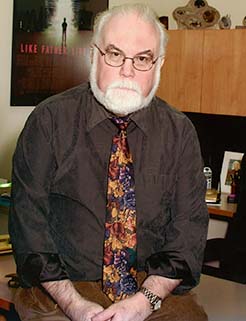Thomas C. Kaufman
Distinguished Professor (Emeritus) - 1993

The tradition of studying the fruit fly (Drosophila melanogaster) at Indiana University is well established. IU geneticist Hermann Muller won the Nobel Prize in 1946 for his work on the biological effects of radiation on fruit files. Nearly 30 years later Thomas Kaufman joined the IU Department of Biology as an assistant professor and began working on the proboscipedia-Antennapedia region of chromosome 3R in Drosophila. He rose to the rank of Professor in 1983 and Distinguished Professor in 1993.
In 1990 he became the first Howard Hughes Medical Institute Investigator in Indiana. The appointment, through August 31, 2000, carries with it an annual average commitment of $500,000 to Kaufman and his laboratory. Research efforts continue to focus on the role of the homeotic Antennapedia complex. The lab has recovered and characterized mutations in all of the resident loci and cloned and sequenced all of the genes and recovered antisera to all of the protein products.
Described by colleagues at IU and throughout the world as a man at the height of his career, Kaufman is routinely invited to give lectures and participate in meetings around the world. He has published prolifically since the beginning of his career.
Kaufman is past president and a member of the Genetics Society of America, and the Drosophila Genome Project. He is on the editorial board of Developmental Genetics, Genetics, Evolution and Development and The Journal of Experimental Zoology. He is past chair of the National Drosophila Board and NIH Genetic Basis of disease Review Committee. He has also organized and chaired three National Drosophila Research Conferences. He was elected fellow of the American Association for the Advancement of Science in 2007.
Twenty-five graduate students have earned their doctorates working in Kaufman's laboratory. Kaufman teaches a graduate course in developmental genetics and a seminar course on research ethics.
Kaufman received the IU Bicentennial Medal in September 2020 in recognition of his distinguished contributions to Indiana University.

